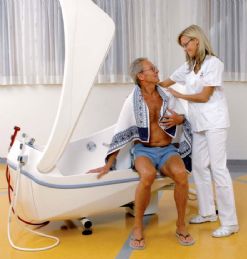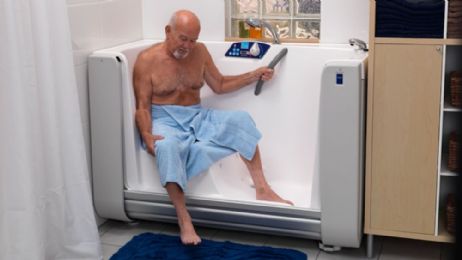

What are Side Access Bathing Systems?
Also known as walk-in bathtubs, side access bathing systems encompass a range of various styles, sizes and configurations for all kinds of potential users with unique requirements. From powered, reclining models for institutional care to compact walk-in tubs for smaller bathrooms, there are formats to accommodate every bathroom and its occupants’ special needs.
While several types of bathing systems highlight different modalities for getting users into and out of the tub, most of the tubs in this category feature a watertight, side entry door. This door can be configured to open inward or outward, and the doorway itself has a very low curb or threshold for the user to step over. Some designs even feature wider doors and the lowest curb possible for easier wheelchair accessibility and patient transfers.
Side access bathing systems are constructed from heavy duty and easy-to-maintain materials to ensure years of heavy and repeated usage, whether in an institutional setting or at home. They are specially designed to be completely watertight with the door closed, and often have high-tech enclosure sealings along with fail-safes to ensure a secured and relaxed bathing experience. State-of-the-art pumping systems both fill and drain the tub much more quickly than conventional bathtubs as well.
What are the Different Types of Side Access Bathing Systems?
Because every potential user and bathroom is different, there are numerous side access bathing system styles to choose from. Customization choices include an inward opening door that may be better for smaller bathrooms with limited space, or an outward opening door that may be better for wheelchair transfers and for more room in the tub. Wider doors are also available for easier access for wheelchair and other kinds of patient transfers.
While the vast majority of side access bathing systems offer a built-in, ADA compliant modular seat, some styles contribute an adjustable reclining and/or supine positioning surface instead. Many models offer therapy accoutrements such as air jets, water jets, aromatherapy, chromotherapy and water temperature regulation. Grab bars and slide resistant flooring and seating strips enhance safety. Here is a brief overview of some of the different types of side access bathing systems:
Side Access with Shower Stall Enclosure Walk-in Tub
Perfect for retrofitting your current small bathtub, shower stall or closet space, a side access walk in tub with a shower stall enclosure can also be installed into an entirely new bathroom construction. This gives users the choice of taking a comfortable sit-down or stand-up shower, or soaking in a bath.
Side Access Compact Walk-in Tub
Compact side access bathing systems can be freestanding or modular in design, and generally fit easily into existing bathtub or shower spaces. They are especially ideal for tiny bathrooms, such as those typically found in mobile homes and apartments. Doors on these models will generally swing inward to create more space in the bathroom.
Side Access Extra Large/Bariatric Walk-in Tub
Offering the utmost in spaciousness, bariatric side access bathing systems are perfect for larger users, or for those who really like to spread out in the bathtub. These tubs safely accommodate much higher user weights, even along with the weight of the water. There are also taller tubs available that allow users to soak up to the neck while sitting, and more comfortably contain taller users.
Side Access Free Standing Walk-in Tub
Often utilized in nursing homes, long-term care facilities, rehabilitation centers and other institutional and healthcare settings, freestanding side access bathing systems are often constructed with a leg design off the floor. This allows for easier accessibility for patient lift devices to slide under the tub.
Side Access Powered Walk-in Tub
Another popular bathing system design for institutional usage is the powered model. Generally featuring powered adjustability, the tub can be raised or lowered for easier patient transfers from wheelchairs or various lift devices. Ergonomic construction ensures better positioning and accessibility for the caregiver or bathing attendant as well.
Who may Benefit from Side Access Bathing Systems?
While just about anyone can enjoy the multiple health and safety benefits of using side access bathing systems, they are especially indicated for anyone with limited or no mobility and ambulation abilities. They can help the elderly or disabled to remain as independent as possible when it comes to personal hygiene as these systems can often enable them to bathe themselves without assistance.
Because the bathroom is the most dangerous room in the house, it simply makes good sense to enhance safety in every possible way. Side access bathing systems help make bathing more secured for every user, but especially for those with debilitating conditions and challenges. Changes to our mobility, vision and strength can often happen gradually over time, so getting ahead of the curve and getting proactive about getting safer systems into place ahead of time can help prevent the dramatic changes that can suddenly occur with a slip and fall accident in the bathroom.
There are a host of health issues and ailments that respond quite favorably to bathing and hydrotherapy, here are just a few of the amazing ways baths contribute to good health and well-being:
Stress reliever, calming, reduces anxiety, depression, fear, insomnia
Analgesic, pain relief, relaxes muscles, tendons, ligaments and joints
Circulation boost, enhances cardio and circulatory function
Lymph drainage, improves lymphatic system flow, reduces cellulite
Respiratory function improvement, facilitates clearer breathing
Digestive enhancement, aids in intestinal function and regularity
Warmth helps people who tend to be cold all the time, can also be used to treat and prevent hypothermia.
Hulet Smith, OT
Rehabmart Co-Founder & CEO
ck